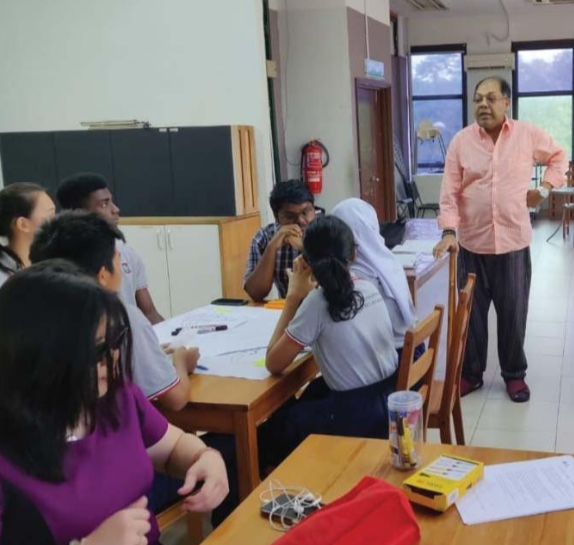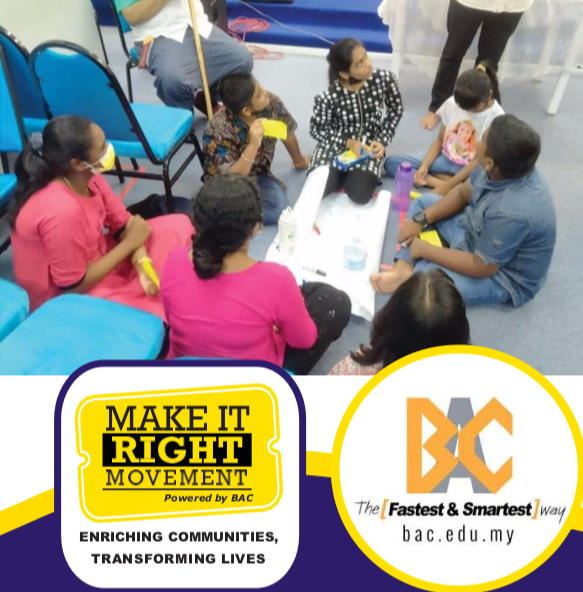Western Sydney University & Young Resilience Research Centre collaborates with MIRM for Mental Health Workshop

In September 2022, the Make It Right Movement (MIRM) teamed up with Western Sydney University and the Young Resilience Research Centre to host a transformative mental health workshop aimed at addressing the growing mental health challenges faced by adolescents and youth in Malaysia. This workshop was part of MIRM’s broader commitment to empowering young people by providing them with the knowledge and tools needed to manage their mental health in a rapidly changing and often stressful world.
The workshop focused on providing young participants, including refugee children, with a platform to discuss their mental health challenges openly and explore coping mechanisms to build resilience. As the mental health of young people continues to be a global concern, this initiative served as a timely intervention to support the well-being of youth, particularly those who face multiple layers of vulnerability.
The Importance of Youth Mental Health
The adolescent years are a critical time for emotional and psychological development. During this period, young people often face a range of stressors, from academic pressures and social relationships to personal crises and, in recent years, the overwhelming uncertainty caused by the COVID-19 pandemic. These challenges can significantly impact mental health, leading to anxiety, depression and other emotional struggles.
Despite the growing awareness of mental health issues, many young people still face stigma when it comes to seeking help, particularly in conservative or underserved communities. This workshop aimed to break that stigma by providing a safe space where adolescents could share their thoughts, feelings and experiences related to mental health.
Aims and Objectives of the Workshop
The collaboration between MIRM, Western Sydney University and the Young Resilience Research Centre was built around a shared goal: to promote mental health awareness among adolescents and empower them with the tools to navigate emotional challenges. The specific objectives of the workshop included:
Providing a Platform for Expression: One of the primary aims was to create an environment where young people could openly discuss their mental health challenges without fear of judgment. This open dialogue was essential in helping participants recognise that they were not alone in their struggles.
Teaching Coping Mechanisms: The workshop introduced participants to various coping mechanisms they could use to manage stress and anxiety. These included mindfulness exercises, emotional regulation techniques and strategies for dealing with trauma or difficult emotions.
Building Resilience: Resilience or the ability to bounce back from adversity, was a key theme throughout the workshop. Participants were taught how to build mental and emotional resilience, helping them develop a positive outlook in the face of challenges and recover more effectively from emotional setbacks.
Promoting Peer Support: The workshop encouraged participants to support one another, fostering a sense of community and shared experience. Peer support was highlighted as a crucial factor in maintaining mental well-being, especially for young people who may feel isolated in their struggles.
Workshop Activities
The mental health workshop was designed to be interactive, engaging and relevant to the participants' experiences. Some of the key activities included:
Group Discussions: Participants were divided into smaller groups where they were encouraged to share their personal experiences with mental health. This allowed them to articulate their feelings and concerns in a supportive environment while also hearing from others who might be going through similar challenges.
Mindfulness and Relaxation Techniques: A key part of the workshop involved teaching participants how to use mindfulness to reduce stress. Through guided breathing exercises, body scans and visualisation techniques, the young people learned how to stay grounded and present in moments of anxiety.
Storytelling and Role-Playing: Storytelling sessions allowed participants to explore different mental health scenarios through role-playing. By acting out various situations, the participants could better understand the importance of emotional regulation and empathy toward others.
Creative Expression: Art and creativity were incorporated as powerful tools for self-expression. Participants were encouraged to draw, write or perform pieces that reflected their inner emotional landscapes. This gave them an outlet to express feelings that might be difficult to communicate through words alone.
Addressing the Needs of Refugee Children
One of the unique aspects of this workshop was its focus on refugee children, who often face additional mental health challenges due to their experiences of displacement, trauma and uncertainty about the future. Refugee children frequently have to deal with issues like homesickness, language barriers and difficulties adjusting to a new culture, all of which can contribute to emotional distress.
MIRM, in partnership with the Young Resilience Research Centre, ensured that these young refugees were given a voice during the workshop. Special sessions were designed to address their specific needs, helping them process their experiences of displacement while building resilience and a sense of belonging in their new environment. The workshop reminded everyone that, regardless of nationality or background, mental health is a universal issue that needs to be addressed with care and understanding.
Outcomes and Impact
The mental health workshop had a profound impact on its participants, many of whom expressed relief at being able to discuss their struggles openly for the first time. By the end of the workshop, participants reported feeling more equipped to manage their emotions and cope with stress. Key outcomes included:
- Increased Awareness: Participants left with a better understanding of mental health and the importance of addressing emotional well-being as part of overall health. They were also more aware of the resources available to them should they need further support.
- Improved Coping Skills: The techniques taught during the workshop, such as mindfulness and emotional regulation, gave participants practical tools they could use in their daily lives to manage stress and anxiety.
- Peer Support Networks: The sense of camaraderie developed during the workshop fostered lasting connections among participants. Many expressed their desire to continue supporting each other beyond the workshop, showing that peer networks can play a significant role in mental health resilience.
- Empowerment of Refugee Youth: The refugee children who attended the workshop felt particularly empowered by the experience. Having their voices heard and their experiences validated gave them a sense of agency and belonging, helping them build resilience for the future.
The Way Forward
Following the success of this workshop, MIRM plans to continue its collaboration with Western Sydney University and the Young Resilience Research Centre to offer similar programs to more young people across Malaysia. The goal is to expand the initiative to reach more schools and communities, ensuring that mental health support is available to all adolescents, particularly those from underserved backgrounds.
MIRM also aims to integrate mental health education into its broader community development efforts, ensuring that mental health awareness becomes a cornerstone of youth empowerment programs.
The collaboration between MIRM, Western Sydney University and the Young Resilience Research Centre on the mental health workshop was a crucial step towards addressing the mental health needs of young people in Malaysia. By creating a safe space for dialogue and equipping participants with practical coping skills, the workshop helped foster emotional resilience and peer support.
As mental health continues to be a pressing issue for adolescents, initiatives like this workshop serve as a vital resource, reminding young people that it’s okay to seek help and that they are not alone in their struggles. Through continued efforts, MIRM hopes to create a future where mental health support is accessible to every young person, regardless of their background.

